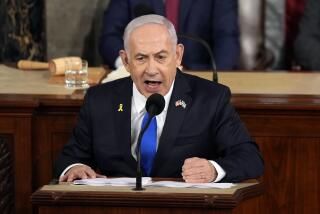U.S. Will Sell Stingers to Chad for Use Against Libya
- Share via
WASHINGTON — The United States has reversed its position and agreed to sell Stinger anti-aircraft missiles to Chad to defend against Libyan air attacks, a Defense Department spokesman said today.
“In response to the continued air threat from Libya, we have decided to honor Chad’s request for Stingers,” Lt. Col. Keith Snyder said. “The package is a complete one, including training.”
Snyder declined to discuss the number of missiles or the delivery schedule, but defense sources said 24 Stingers and seven launchers worth a total of $2 million would be delivered in about two weeks.
Snyder conceded that past U.S. policy has been not to supply the sophisticated weapon to African governments, although the South African-backed UNITA rebel movement in Angola has received Stingers under a covert aid package.
“Obviously, there has been a shift,” Snyder said.
He said the Administration had consulted with Congress on the matter.
Sen. Dennis DeConcini (D-Ariz.), one of the major opponents of Stinger sales to Africa and the Middle East, was briefed on the deal by Assistant Secretary of State Chester Crocker, aides said.
DeConcini, who has proposed legislation to ban the sale of Stingers to Persian Gulf nations, is “very concerned” about the lack of proper safeguards in Chad to protect the Stingers from falling into the wrong hands, one aide said.
The United States has been running a military supply and training program of about $32 million to Chad over the last two years. Chad had pressed for the Stingers, saying it needed the missiles to shoot down Soviet-made Libyan jet fighters bombing the contested Aouzou Strip in the northern part of Chad.
Libyan troops invaded the mineral-rich Aouzou 14 years ago and since January Chad, with U.S. and French support, has dislodged most of the Libyans. U.S. intelligence experts say about 4,000 Libyans remain in Aouzou and around the border area.
The two countries submitted their dispute to mediation by the Organization of African Unity in September.
More to Read
Sign up for Essential California
The most important California stories and recommendations in your inbox every morning.
You may occasionally receive promotional content from the Los Angeles Times.













